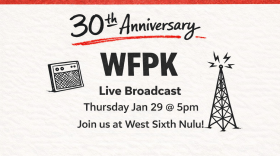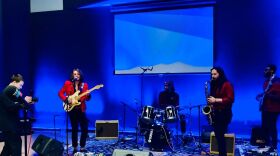When William Reid says the new Jesus and Mary Chain album Glasgow Eyes began in disaster, he’s not being dramatic. “We started in October 2019, just before lockdown,” he says. “Got maybe five decent backing tracks down, and then — lockdown. We came back a year later, ready to finish the record, and the engineer told us he’d lost everything. All of it.”
He pauses for a beat. “I’ve been doing this 40 years. The only thing close was in 1989 when a tape-op recorded over a mix. That was one song. This was six. It was heartbreaking.”
The lost sessions didn’t sink them. “We just picked ourselves up, like that Chumbawamba song,” he says, dryly. “Went to Glasgow and re-recorded everything. And actually? Some songs turned out better. But I still won’t forgive the engineer. In this day and age, not backing up digital recordings is insane. It’s not 1995 anymore.”
For all the pain, Glasgow Eyes arrived right on time — the band’s 40th anniversary. Not that Reid gives much thought to the milestone. “We weren’t aware of it,” he shrugs. “Forty years, sixty years — who cares? Nobody’s fading away anymore. Kim Deal’s making great records at 60. The Stones put out a decent album at 80. It’s a new world. Nobody’s ‘too old’ unless they want to be.”
That idea — that rock doesn’t age, it just mutates — runs all through Glasgow Eyes. It’s as noisy and narcotic as anything the band’s ever done, but it also has flashes of warmth and melody, songs that sound as if they’ve learned to breathe without losing the bite. “I used to hate jazz,” Reid says. “Now I love it. Same with prog rock. I used to laugh at it — now I’m a big Robert Fripp fan. I think when you’ve lived this long, everything just seeps in. You stop rebelling against things. You just love music.”
He laughs about how that open-mindedness once got him in trouble. “When punk happened, people thought you had to give up everything else. Like, you couldn’t listen to Led Zeppelin or the Eagles anymore. But I was a punk who still loved Peter Frampton. I didn’t think you had to give up what you love. That’s the difference between fans and musicians — musicians love everything. I mean, I love the Barbie song. Why wouldn’t I? It’s a great record.”
The band’s new song “The Eagles and the Beatles” started as a joke — and a bit of truth. “Originally there was a verse about the Eagles that got cut, but I kept the title,” he says. “It’s really about loving music, about showing people that you can be into everything. You can love the Clash and Hotel California. Why not?”
That balance between noise and sweetness defines Glasgow Eyes. The feedback squalls are still there, but so are songs like “Mediterranean X Film” and “Second of June,” as tender as anything they’ve done since Darklands. “Sometimes the songs take you somewhere you don’t expect,” Reid says. “You think you’re producing the song, but really the song’s producing you. One wrong chord — like I hit an F minor instead of a G — and suddenly the whole thing opens up. You just follow it. Accidents are everything.”
He compares it to the Velvet Underground, to whom the band pays explicit tribute on the closing track “Hey Lou Reed.” “It’s about the connection we’ve always felt,” he says. “We weren’t virtuosos, and neither were they. The Velvets taught us that simple isn’t easy — that you can play two or three notes and still be brilliant. People think simple means lazy. It doesn’t. It means you’re not bullshitting.”
Still, there’s something almost touching about Reid talking 40 years on like a lifer who’s still in disbelief the thing works. “I don’t ever want to get too clever,” he says. “I always want that ten percent of not knowing what the fuck I’m doing. That’s where the magic comes from. If you get too good, you lose it.”
Even as he’s releasing Glasgow Eyes, he’s wrestling with another kind of creative chaos — writing a memoir with his brother Jim. “It’s not finished,” he admits. “Probably takes us up through the ’90s. Doing it feels like going to the dentist. You get asked, ‘What happened in 1984?’ and I’m like, ‘I have no idea.’ Half of it’s fantasy anyway. Five people can live through the same thing and tell five different stories. I don’t even trust my own memory.”
But for a band whose career was born out of distortion, dissonance, and sheer stubbornness, that unreliability feels fitting. Reid laughs about it all now — the lost tapes, the ghosts, the endless noise. “It’s still fun,” he says. “We’ve got a bit of fire left. And a bit of spunk. That’s all you really need.”
Watch the full interview above and then check out the video below.






